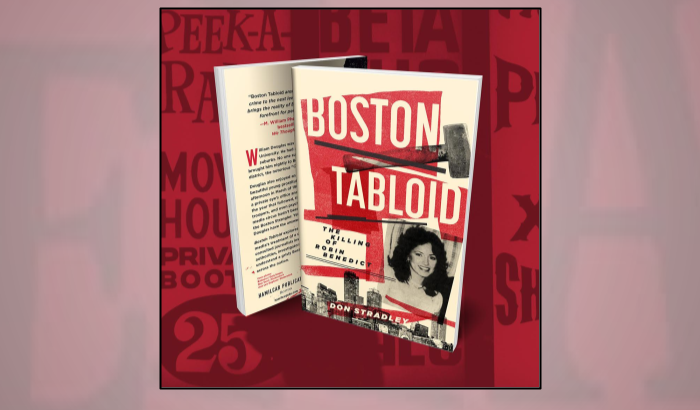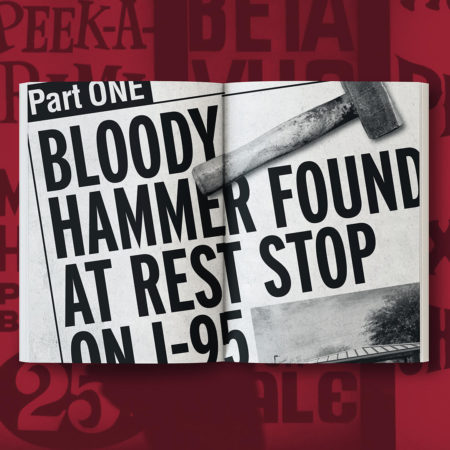
An exploration of “a man’s bizarre obsession and the media’s treatment of a complex case.”
Below is an excerpt from Boston Tabloid: The Killing of Robin Benedict by author Don Stradley, out now in trade paperback via Hamilcar Publications. A description of the book from the author precedes the sample chapter …
William Douglas was a respected professor from Tufts University. He had a loving family and a home in the suburbs. No one suspected he had a secret life that brought him nightly to Boston’s adult entertainment district, the notorious “Combat Zone.”
Douglas also enjoyed an ongoing arrangement with a beautiful young prostitute named Robin Benedict. One afternoon in March of 1983, a small-time pimp walked into a private eye’s office and claimed Robin was missing. In the year that followed, the case drew in detectives, state troopers, and even psychics. The ensuing investigation and media circus hadn’t been seen in the city since the days of the Boston Strangler. Yet Robin remained missing. Did Douglas have the answer?
Boston Tabloid explores a man’s bizarre obsession, and the media’s treatment of a complex case. Author Don Stradley consulted journalists involved in the newspaper blitz, prison authorities, investigators, and psychiatrists, all in an effort to understand a grisly Boston crime that grabbed headlines across the nation.
“Bloody Hammer Found at Rest Stop on I-95”
Sunday, March 6, 1983. It was one of those damp, chilly mornings that made New Englanders feel springtime would never come. It would’ve been a nice morning to sleep in, but some folks were out and about.
Two unemployed men were checking out dumpsters along Interstate 95 near the Mansfield exit. Freezing temperatures be damned—there were empty bottles and cans to find and cash in. Massachusetts had just passed the bottle bill on January 1 that year, but it was already common to see people scrounging around at rest stops along the highway. Grab enough empty bottles at five cents per deposit, and you could keep yourself in cigarettes and lottery tickets for the weekend, or maybe a six-pack of Pabst Blue Ribbon, just enough to drive the new concept of bottle returns.
The two men, Joseph Plotegher and Robert Jewell, approached a trash barrel that looked promising. On Sundays, the rest stops were always full to bursting with empties, all a result of the Saturday night traffic. They rooted around and lifted out a mysterious bundle. It was a brown plastic kitchen bag, tied at the top with a knot. Inside was a woman’s tan corduroy blazer. It was folded around something hard and lumpy.
Wrapped snugly inside the blazer, which smelled of expensive perfume, were two items: a man’s blue shirt and a small sledgehammer.
 The hammer was sticky. The men saw dark traces on the handle, like two large freckles, of what they guessed to be blood. Stuck to the hammer was a single strand of long dark hair. The clothing also had traces of what appeared to be blood. It was enough to send a shiver dancing up the men’s spines. They debated calling the police but decided against it. Why get involved with the cops?
The hammer was sticky. The men saw dark traces on the handle, like two large freckles, of what they guessed to be blood. Stuck to the hammer was a single strand of long dark hair. The clothing also had traces of what appeared to be blood. It was enough to send a shiver dancing up the men’s spines. They debated calling the police but decided against it. Why get involved with the cops?
They put the bag back in the trash barrel and moved on. There were more dumpsters to check along the highway. Maybe they could be done by noon, home in time for some Sunday sports on TV.
But Plotegher was bothered. Had that really been blood on the hammer? Had someone been whacked on the head? And it had been one mean mother of a hammer, the kind you usually see on demolition sites, the kind that smashes plaster out of walls.
Within a few hours, Plotegher called the Massachusetts State Police in Foxborough and described what he’d seen.
Later, a police lab identified the blood type on the jacket. It matched that of a missing woman named Robin Benedict. In Boston’s adult entertainment district, she was known as “Nadine” and was rumored to make $1,000 per night as a prostitute.
***
On average, two Boston prostitutes were killed per year in those days. The corpses turned up in the strangest places: one body was found in a pond in New Hampshire; another was stuffed in a car parked outside a church in Lawrence, a city north of Boston. Some turned up in grassy areas along the highway; some were found in their apartments. They died in different ways. Some were shot. Some were strangled or beaten to death. In 1979, a twenty-six-year-old shoe salesman from the Boston suburb of Everett, Glenn Breese, received a life sentence for the murder of twenty-two-year-old prostitute Karen Blumenthal. He’d stabbed her forty-three times with a serrated steak knife.
Unlike the Blumenthal case, most of the murders went unsolved. Although the term “Combat Zone Killer” wasn’t being used, Boston’s homicide division wondered if a maniac was seeking victims in the Zone. Or maybe a variety of men were killing prostitutes and slipping out of town like phantoms. Detective Lieutenant Arthur Kelley felt it was unlikely for these prostitute murders to ever be solved.
“Look,” he told the Boston Globe during the Blumenthal investigation, “say a john leaves the Zone with an intended victim. You have to find someone who saw them leave, a witness who can definitely place the victim and the suspect together—and then get the evidence to prove that this guy is the one who committed the crime. No guy visiting the Zone wants to get involved for fear of publicity. And the prostitutes have not been willing to talk because they have been scared of being singled out and slain themselves.”
Four years later, it appeared Robin Benedict had joined the list of Boston’s murdered prostitutes. Had she known about those other unfortunate women and their unsolved murders? A few of the bodies had actually been dumped in the Greater Lawrence area, only a few miles from her own childhood home. Had she ever imagined that she, too, would come to such a grisly end?
But how could she have known that one of her clients was capable of killing her, or that his name would be forever synonymous with nightfall, obsession, and sickening violence?
hamilcarpubs.com
Dig Staff means this article was a collaborative effort. Teamwork, as we like to call it.

